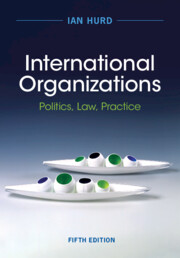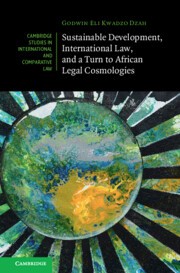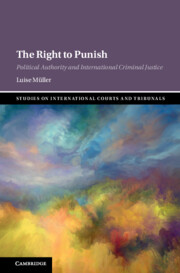52113 results in International relations and international organisations
6 - Ecocosmologies, Ecolegality, and African Environmentalisms as Ecological Law
- from Part III - Thinking Alternatives
-
- Book:
- Sustainable Development, International Law, and a Turn to African Legal Cosmologies
- Published online:
- 16 May 2024
- Print publication:
- 23 May 2024, pp 245-277
-
- Chapter
- Export citation
Index
-
- Book:
- Sustainable Development, International Law, and a Turn to African Legal Cosmologies
- Published online:
- 16 May 2024
- Print publication:
- 23 May 2024, pp 368-374
-
- Chapter
- Export citation
Copyright page
-
- Book:
- The Right to Punish
- Published online:
- 16 May 2024
- Print publication:
- 23 May 2024, pp vi-vi
-
- Chapter
- Export citation
3 - Sustainable Development and the Paradox of Legal Universalism
- from Part II - Universal, Pluriversal, and in Between
-
- Book:
- Sustainable Development, International Law, and a Turn to African Legal Cosmologies
- Published online:
- 16 May 2024
- Print publication:
- 23 May 2024, pp 107-144
-
- Chapter
- Export citation
5 - Fairness, Equality, and Democratic Authority
-
- Book:
- The Right to Punish
- Published online:
- 16 May 2024
- Print publication:
- 23 May 2024, pp 109-155
-
- Chapter
- Export citation
Index
-
- Book:
- The Right to Punish
- Published online:
- 16 May 2024
- Print publication:
- 23 May 2024, pp 179-184
-
- Chapter
- Export citation
2 - The Permissibility of Punishment
-
- Book:
- The Right to Punish
- Published online:
- 16 May 2024
- Print publication:
- 23 May 2024, pp 20-46
-
- Chapter
- Export citation
Part III - Thinking Alternatives
-
- Book:
- Sustainable Development, International Law, and a Turn to African Legal Cosmologies
- Published online:
- 16 May 2024
- Print publication:
- 23 May 2024, pp 199-292
-
- Chapter
- Export citation
3 - The Authority to Punish
-
- Book:
- The Right to Punish
- Published online:
- 16 May 2024
- Print publication:
- 23 May 2024, pp 47-74
-
- Chapter
- Export citation
Dedication
-
- Book:
- Sustainable Development, International Law, and a Turn to African Legal Cosmologies
- Published online:
- 16 May 2024
- Print publication:
- 23 May 2024, pp v-vi
-
- Chapter
- Export citation
6 - Conclusion
-
- Book:
- The Right to Punish
- Published online:
- 16 May 2024
- Print publication:
- 23 May 2024, pp 156-166
-
- Chapter
- Export citation
Acknowledgements
-
- Book:
- Sustainable Development, International Law, and a Turn to African Legal Cosmologies
- Published online:
- 16 May 2024
- Print publication:
- 23 May 2024, pp xv-xvii
-
- Chapter
- Export citation
Polarization and Populism in Latin America
-
- Journal:
- Latin American Politics and Society / Volume 66 / Issue 2 / May 2024
- Published online by Cambridge University Press:
- 22 May 2024, pp. 179-195
-
- Article
-
- You have access
- Open access
- HTML
- Export citation
Widening the gap of political inequality? The effect of the COVID-19 pandemic on political engagement
-
- Journal:
- European Political Science Review / Volume 16 / Issue 4 / November 2024
- Published online by Cambridge University Press:
- 21 May 2024, pp. 557-577
-
- Article
-
- You have access
- Open access
- HTML
- Export citation

International Organizations
- Politics, Law, Practice
-
- Published online:
- 17 May 2024
- Print publication:
- 06 June 2024
-
- Textbook
- Export citation

Sustainable Development, International Law, and a Turn to African Legal Cosmologies
-
- Published online:
- 16 May 2024
- Print publication:
- 23 May 2024

The Right to Punish
- Political Authority and International Criminal Justice
-
- Published online:
- 16 May 2024
- Print publication:
- 23 May 2024
Precarity and Hope in Contemporary Latin America
-
- Journal:
- Latin American Research Review ,
- Published online by Cambridge University Press:
- 16 May 2024, pp. 1-12
-
- Article
-
- You have access
- Open access
- HTML
- Export citation
What drives trust in regulatory agencies? Probing the relevance of governmental level and performance through a cross-national elite experiment on EU regulation
-
- Journal:
- European Political Science Review / Volume 16 / Issue 4 / November 2024
- Published online by Cambridge University Press:
- 13 May 2024, pp. 539-556
-
- Article
-
- You have access
- Open access
- HTML
- Export citation
Lip service to liberal democracy in Western Europe?
-
- Journal:
- European Political Science Review / Volume 16 / Issue 4 / November 2024
- Published online by Cambridge University Press:
- 13 May 2024, pp. 521-538
-
- Article
-
- You have access
- Open access
- HTML
- Export citation

